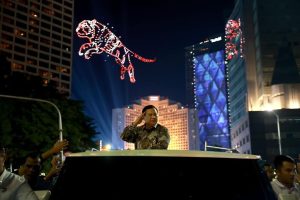More than four-fifths of Indonesians approve of the job that President Prabowo Subianto has done since his inauguration in October, as he prepares to mark his 100th day in office.
In a survey of 1,000 respondents conducted on January 4-10 by the research unit of the newspaper Kompas, 80.9 percent said that they were satisfied with Prabowo’s performance in office so far.
As Bloomberg reported, about 84.7 percent of lower-income respondents were satisfied with Prabowo’s leadership and his populist policies. The survey also revealed a 72.1 percent approval rating for the government’s performance in upholding the rule of law and a 74.5 percent rating for its economic policies.
Prabowo also had a good image as a president, with 94.1 percent of respondents describing him as a “good” or “very good” leader, while Vice President Gibran Rakabuming Raka received a favorability rating of 79.9 percent. Another 89.4 percent of respondents expressed trust in the administration’s leadership.
For those respondents who expressed confidence in Prabowo’s performance, one of the most important factors was the perception that he had largely delivered on his election promises. “Those who were satisfied reasoned that every program promised had started to be implemented,” Kompas said, according to a report by Reuters. Most notable among them was Prabowo’s multi-billion dollar free meal scheme, which began on January 6, with the provision of food to 570,000 people.
The free meal plan is intended eventually to provide nutritious meals to 82.9 million people by 2029, most of them schoolchildren and pregnant women, although Prabowo has recently sought additional funds in order to hit this target by the end of 2025. While the plan has unsettled financial markets, which say that the trillions of rupiah necessary to fund the program will undermine Indonesia’s reputation for fiscal prudence, it has been popular with the Indonesian public. In the Kompas survey, more than 83 percent of respondents expressed approval for the Prabowo administration’s handling of social welfare issues.
While it is difficult to draw sweeping conclusions from a single poll, Prabowo’s sky-high approval rating suggests that the former general continues to ride the wave of momentum that swept him to victory at the presidential election last February. In a three-way contest, he and Gibran won around 58 percent of the vote, and prior to his inauguration, his approval rating topped 90 percent, according to rival pollster LSI.
Prabowo’s self-image as a man of action who is unafraid to make bold decisions has been strengthened by his actions since assuming office and is largely unaffected by concerns about the erosion of democratic norms before, during, and after last year’s election. Late last year, Prabowo made the last-minute decision to cancel a value-added tax hike, not long after writing off around $550 million in debt for small businesses. He has promised to take on debt to fund expansive plans, including his free meal program, which has been rolled out in short order. On the foreign policy front, he has also reversed Jokowi’s position on membership in the BRICS economic grouping – Indonesia became the first Southeast Asian member of BRICS earlier this month – and began his term with state visits to China and the United States.
One hundred days is a long time in politics, but the survey results are a sign that Prabowo’s political fortunes will remain buoyant for the rest of 2025. Even his predecessor Joko “Jokowi” Widodo, who enjoyed some of the highest approval ratings of any Indonesian president since the fall of Suharto in 1998, only managed an approval rating of 65.1 percent after his first 100 days.

































